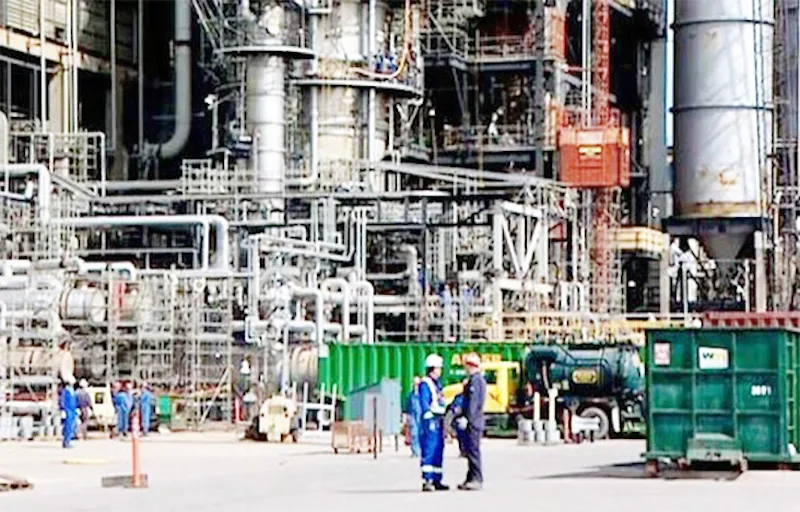NNPC to Stop Petrol Imports as Dangote Refinery Takes Over
Starting in October 2024, the Nigerian National Petroleum Company Limited (NNPC) will stop importing petroleum products, provided the local price from the Dangote Refinery remains competitive.
This marks a significant shift in Nigeria’s petroleum supply chain, as NNPC plans to rely on the Dangote Refinery for its supply of petrol and diesel.
Join our WhatsApp ChannelAccording to industry insiders, this move could dramatically reduce Nigeria’s reliance on imported fuel.
“NNPC has notified the Nigerian Upstream and Downstream Petroleum Regulatory Authority (NMDPRA) that it will no longer import petroleum products if the price is competitive,” a source familiar with the matter told The Whistler.
Crude Oil Supply and Local Transactions
From October 1, NNPC will begin supplying the Dangote Refinery with around 385,000 barrels of crude oil per day. Unlike previous arrangements, payments will be made in naira.
In return, the refinery will provide petrol and diesel of equivalent value, also to be paid in naira. The NNPCL will be the sole off-taker for petrol, while diesel will be available for purchase by any interested marketers.
Zach Adedeji, Executive Chairman of the Federal Inland Revenue Service (FIRS), confirmed this development, stating, “The refinery will begin lifting 25 million litres of petrol per day starting from September 15. NNPC will be the exclusive buyer for petrol, while diesel will be available for sale to other marketers.”
Lagos State Plans Traffic Management for Fuel Distribution
As the Dangote Refinery prepares to start distribution, the Lagos State Government is implementing a comprehensive traffic management plan to ease movement along the Lekki-Ajah corridor.
This area is expected to experience increased activity as tankers transport refined petrol to various parts of the country.
Sola Giwa, the Special Adviser to Governor Babajide Sanwo-Olu on Transportation, assured residents that steps are being taken to prevent traffic disruptions.
“We have fortified the Lagos State Traffic Management Authority (LASTMA) with new equipment and trained personnel. They will be deployed to manage traffic effectively,” he said in a statement.
To address potential issues, LASTMA has mobilised advanced tow trucks and emergency response teams to ensure quick resolution of any disruptions. Medical services are also on standby in case of emergencies.
Giwa added, “We urge residents and commuters in the Lekki-Ajah area to remain calm. The government is fully prepared to manage the situation.”
NNPC Halts Fuel Imports: What It Means for Nigeria
This development could bring major changes to Nigeria’s petroleum industry. From October, the NNPCL has forecast that the Dangote Refinery will produce 389.16 million litres of petrol in September alone.
Production is expected to rise to over 1.45 billion litres by December 2024.
With this projected supply, NNPC has not placed any petrol import orders for October. Instead, all fuel requirements will be sourced domestically from the Dangote Refinery.
READ ALSO: NNPCL Deploys 300 Trucks To Load Petrol At Dangote Refinery
“This shift to local sourcing will enhance our energy security and reduce foreign exchange pressure,” an industry expert explained.
The Nigerian Upstream and Downstream Petroleum Regulatory Authority (NMDPRA) has been tasked with verifying the refinery’s production figures. By January 2025, production is projected to hit 1.47 billion litres, further strengthening Nigeria’s capacity for domestic fuel supply.
Lagos State Calls for Strict Adherence to Traffic Regulations
With increased fuel distribution activity, the Lagos State Government emphasised the importance of compliance with traffic regulations.
LASTMA will closely monitor tanker operators, especially as they load and navigate the Lekki-Ajah axis.
“All motorists, especially commercial drivers, are warned to follow traffic laws. Violations, such as driving against traffic or stopping at undesignated locations, will be met with strict enforcement,” Giwa stated.
The government has issued warnings to bus operators to avoid actions that could exacerbate traffic congestion during this period of increased industrial activity.
In collaboration with relevant stakeholders, Lagos is taking proactive measures to avoid major traffic issues while ensuring efficient fuel distribution across the state.
The government’s strategy includes close coordination with tanker operators, traffic enforcers, and medical responders to guarantee smooth operations as the Dangote Refinery begins full-scale fuel production.
Dangote Refinery’s Role in Nigeria’s Energy Future
The Dangote Refinery is set to revolutionize Nigeria’s petroleum industry by drastically reducing the nation’s reliance on imported fuel.
With the local market poised to receive steady supplies of petrol and diesel, this new arrangement could have long-term implications for Nigeria’s energy security and economic stability.
As the refinery begins operations, Nigerians can expect a shift towards locally refined petroleum products, bringing potential savings in foreign exchange and enhanced fuel availability.
For the first time, Nigeria’s refining capacity is expected to meet a significant portion of domestic fuel demand, a move that could lead to reduced pump prices and better fuel distribution across the country.
The coming months will test how well the country adapts to this new era of energy self-sufficiency, with the Dangote Refinery playing a crucial role in this transformation.
Emmanuel Ochayi is a journalist. He is a graduate of the University of Lagos, School of first choice and the nations pride. Emmanuel is keen on exploring writing angles in different areas, including Business, climate change, politics, Education, and others.



















Follow Us